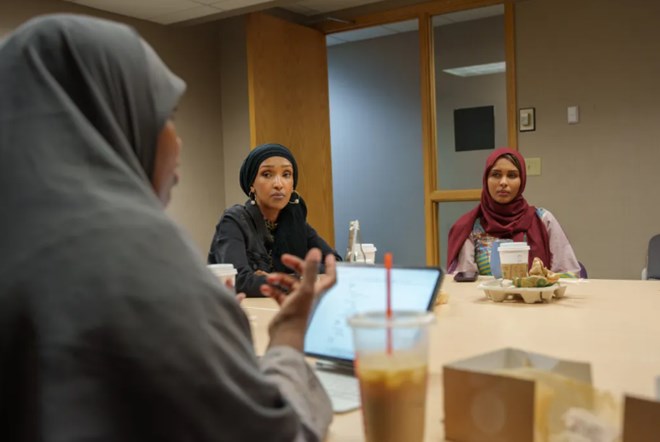
By NOOR ADWAN
Tuesday August 16, 2022

On Sunday, August 14, the Famine Relief Committee, a community group, came together in Minneapolis to plan a fundraising campaign directed toward the drought and famine in the Horn of Africa. The organizers hope to raise $2 million by the end of the year. Credit: Drew Arrieta | Sahan Journal
As millions of people face severe hunger in the Horn of
Africa as a result of the worst drought the region has faced in more than 40
years, the Somali diaspora in Minneapolis is once again rising to the occasion
to raise funds and awareness for those back home.
One such event is a banquet to be held September 16 by the
Famine Relief Committee, a coalition of people from all walks of life—business
owners, nonprofit organizers, politicians, and local Muslim leaders—that takes
a decentralized and community-oriented approach to organizing.
And it’s effective. Last year, the committee raised $420,000
with a similar banquet.
Yusra Arab, a former mental health practitioner and policy
aide to the Minneapolis City Council, joined the coalition to ensure that
Somalis have support and assistance from the diaspora. She hopes that this
event—part of a monthslong series of events to send aid back home—will help
provide more than just a Band-Aid solution to those affected by famine and
drought in Somalia.
“How do we build
resiliency?” Yusra asked. “How do we work with the people and the government so
that this doesn’t become a reoccurring issue?”
Yusra Arab, a former policy aide to the Minneapolis City Council, joined the coalition to ensure that Somalis have support and assistance from the diaspora. “How do we build resiliency?” Yusra says. “How do we work with the people and the government so that this doesn’t become a reoccurring issue?” Credit: Drew Arrieta | Sahan Journal
A history of helping
This isn’t the first time that Minneapolis’ Somali community
has mobilized to send aid back home. In April, about 40 organizers pledged to hold
fundraising efforts to rebuild a market in Hargeisa, Somaliland, that was
destroyed by a fire. They raised more than $1 million in under two weeks, Yusra
said.
Abdirahman Kahin is a local organizer and the owner of Afro
Deli and Grill. He describes himself as a humanitarian and philanthropist, and
worked with about 20 other community stakeholders, including Arab, to put
together the upcoming banquet.
Their goal—$2 million before the end of this year—is more
aggressive than their last, Kahin said. They’ve already collected about
$50,000.
The money they raise with this event will go to Humanitarian
African Relief Organization, a nonprofit dedicated to providing humanitarian
relief to people living in the horn of Africa. Humanitarian African Relief held
a fundraising dinner of its own on August 13.
A familiar disaster,
but even worse this time
Famine is particularly acute in Somalia due to four
consecutive seasons of little rain and global supply chain issues caused by the
COVID-19 pandemic and Russia’s invasion of Ukraine, according to the United
Nations. It is also possible that the upcoming October-December rain season
will also fail, which would lead to further crop failure and livestock death.
This is the region’s worst climate change-related disaster in 40 years,
according to UNICEF.
“They stopped sending kids to school because of the severity
of the hunger,” Kahin said. More than 400,000 Somali children are at risk of
dropping out of school due to famine and drought, according to Cooperative for
Assistance and Relief Everywhere International.
Arab said the majority of East Africans across the globe
have some level of connection to the crisis.
“I have families
firsthand who lost half of their livestock, who were forced to migrate to big
cities, who now rely on us being able to send money back home so that they can
survive.” YUSRA ARAB, AID ORGANIZER
“I have families firsthand who lost half of their livestock,
who were forced to migrate to big cities, who now rely on us being able to send
money back home so that they can survive,” she said.
Famine is not new to Somalia, Kahin noted. Over a quarter of
a million people, half of whom were children, died as a result of the 2011
famine, according to the United Nations. The country narrowly escaped famine in
2017.
“There is a little bit of fatigue,” Kahin said. “Every year
when you raise money for famine, famine, famine—people, they just think it’s
normal. It’s not normal.”
This fatigue is why events like the banquet are so
important, he added. Not just for collecting monetary aid, but also to inform
people and mobilize the community to act.
“There is a little bit of fatigue. Every year when you raise
money for famine, famine, famine—people, they just think it’s normal. It’s not
normal.” ABDIRAHMAN KAHIN, FUNDRAISING ORGANIZER AND OWNER OF AFRO DELI
“Our biggest role right now in the community is not just to
raise money, but also to raise awareness,” Kahin said.
The Famine Relief Committee and the Humanitarian African
Relief Organization are far from the only groups working to alleviate the
crisis in Somalia. Read Horn of Africa, a Minneapolis-based nonprofit, held an
informational event August 12, and is holding an online fundraiser.
Abdirizak Abdi, an organizer with Read Horn of Africa, said
that organizing aid in the diaspora is widespread, even at the family level.
“There’s a lot of great initiatives going on in the Twin
Cities by different organizations and individuals–even at the family level,”
Abdirizak said. “The communities in the diaspora are really very much connected
with people back home.”
Kahin said he hopes that this type of community organizing
becomes self-sustaining, and the primary player in humanitarian relief efforts.
Help, Kahin said, should come from the community first. “We
have to be the first responder,” he said.